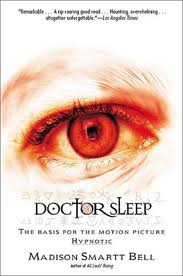Thanks to Stona Fitch and his Concord Free Press publication of Madison Smartt Bell’s latest book of short stories, Zig Zag Wanderer, I hoarded all his published work and am making my way through them over the course of the summer.
Two of his early novels, Soldier’s Joy and Doctor Sleep, I’ve just finished reading.
Soldier’s Joy tells of a Vietnam vet who returns to his dilapidated homestead just outside of Nashville (Tennessee is Bell’s home state). Fully the first 100 pages of the book are protagonist Thomas Laidlaw’s interaction with the land and its creatures (the only dialogue in this section is only the tight-lipped response necessary for a local handy man helping with plowing and such). Bell is consistently respectful and awed by the nascent intelligence in animals and the land itself. Bell’s also an evocative and informed storyteller, going into great and sumptuous detail in following Laidlaw’s autodidact training as a virtuoso banjo player. The story becomes complex as a fellow veteran and family friend returns, and yet another veteran joins with other local racists to make life hard. Taking the war home with them against such a lushly drawn bucolic backdrop makes for a dramatic and dynamic narrative utterly unique and memorable.
Doctor Sleep (not the Stephen King novel of much later vintage) tells of an insomniac hypnotherapist in London. The occasions where he drifts off on the tube or in other less convenient situations are studies in understated alternate reality. Again, the inherent intelligence of objects, the concept of omniscience and omnipotence through mind control are central concerns. This book was made into the film Close Your Eyes, which revolves around a serial killer scenario which, in the book, occupies only a novelty position. People who’ve seen the movie (I haven’t) have dissed the book as being wholly unlike the film. My impression, coming the other way, is that this book is way too interesting to be a movie.
I love Bell’s writing, and most of all, the breadth and scope of his characterizations.
I’ll be reading all of him, but right now, a bit more rigor: started Thomas Piketty’s Capital in the 21st Century.
Never miss out on Christopher’s events or special notices.


